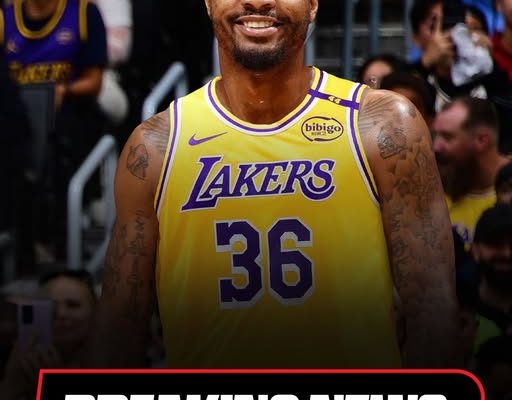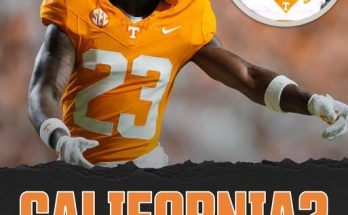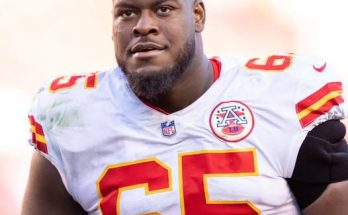Marcus Smart has always been known for doing the dirty work—diving for loose balls, locking up opposing stars, barking instructions like a floor general possessed. Now, the defensive stalwart and emotional heartbeat of a team is heading to Hollywood. In a move that has sent shockwaves across the NBA landscape, Smart has agreed to a contract buyout with the Washington Wizards and intends to sign a two-year, \$11 million deal with the Los Angeles Lakers once he clears waivers. This seismic development could have major implications for the Lakers’ title aspirations and the identity of their roster moving forward.
For the Wizards, this move was less about basketball and more about future flexibility. Washington has been undergoing a complete teardown in the wake of years of mediocrity, and Smart—while still valuable—never fit into their long-term plans. Acquired as part of the three-team deal that ultimately sent Kristaps Porzingis to Boston and netted Smart from Memphis, the former Celtic was always seen as more of a transitional asset than a foundational piece. His leadership and edge were appreciated in Washington’s locker room, but the team’s direction was unmistakably toward a youth movement. For Smart, the decision to seek a buyout was as much about basketball fit as it was about legacy. He didn’t want to spend his prime years mentoring rookies while chasing ping-pong balls in the lottery. He wanted to win—and in L.A., he sees a chance to do just that.
Smart’s arrival in Los Angeles has the potential to be transformative. The Lakers, still led by LeBron James and Anthony Davis, have spent the offseason carefully retooling the roster to compete in an ever-deepening Western Conference. With the additions of Dalton Knecht, Jalen Hood-Schifino’s continued development, and steady role players like Gabe Vincent and Rui Hachimura, the Lakers have been in search of one critical piece—someone who could give them an edge on defense, vocal leadership, and playoff toughness. Smart checks all those boxes. In many ways, he’s exactly what the franchise has lacked since the departure of Alex Caruso: a perimeter disruptor who can guard multiple positions, energize teammates, and make winning plays that don’t always show up in the box score.
From a basketball standpoint, Smart fits seamlessly into the Lakers’ rotation. Whether he starts or comes off the bench, he’ll provide instant grit and IQ. He’s capable of guarding positions 1 through 3, and in small-ball lineups, can even hold his own against some 4s. Offensively, he’s not a pure shooter, but he’s improved as a playmaker and can run second units or even take over primary ball-handling duties in spurts. The Lakers will be able to use him in a variety of roles—spot minutes with the starters, a closer in crunch time, or the anchor of a high-energy bench mob. Perhaps most importantly, Smart brings a mentality that elevates those around him. He’s a culture guy. For a franchise often defined by star power and flash, Smart’s lunch-pail work ethic offers a necessary counterbalance.
From Smart’s perspective, the fit makes just as much sense. After spending nine years in Boston and one in Memphis, the 30-year-old guard is clearly at a point in his career where winning is everything. He’s made a deep playoff run. He’s won Defensive Player of the Year. He’s been the heart and soul of a contender. But he’s never won a title. That matters. With LeBron likely entering the final stages of his legendary career, Smart has a chance to be part of something special—either helping the King secure one final ring or becoming part of a foundational pivot into the next generation. His leadership will be crucial, especially in high-pressure playoff moments where composure, defense, and grit make the difference between winning and going home.
The Lakers are betting that Smart’s intangibles will outweigh any limitations in his offensive game. In today’s NBA, defense is increasingly at a premium, especially when it comes packaged with leadership. Smart gives L.A. both in spades. This isn’t just a basketball decision—it’s a cultural move. It’s a signal that the Lakers are prioritizing winning basketball over highlight reels. That they understand the window for a championship with LeBron and AD is shrinking and that any addition must bring both talent and tenacity. The fact that they were able to land Smart on a relatively team-friendly deal—two years, \$11 million—is nothing short of a coup. In a market where defensive specialists with pedigree can command much more, this may go down as one of the offseason’s smartest acquisitions.
But for Smart, the stakes are personal. When the Celtics traded him, it was more than just a basketball decision—it was the end of a deep connection between player and city. Boston was where Smart grew up in the league, where he poured his heart into every game, often playing through injuries, frustrations, and shifting expectations. Leaving Boston was emotional. Memphis offered a fresh start, but injuries and Ja Morant’s suspension chaos created instability. Smart’s season in Memphis was up and down, and despite flashes of brilliance, it never quite felt like home. Washington was never going to be more than a stopgap. But now, in Los Angeles, Smart gets a chance to reshape his narrative. To go from beloved former Celtic to tenacious Laker, seeking the one thing that’s always eluded him: a championship ring.
The Lakers fan base, known for its passion and high expectations, is likely to embrace Smart quickly. He’s not flashy, but he’s honest. He’ll give his all, whether it’s chasing a loose ball, drawing a charge, or locking down an All-Star on defense. That kind of effort doesn’t go unnoticed in Los Angeles, especially when it contributes to winning basketball. Smart may never score 30 points in a playoff game, but he’ll win possessions—and sometimes, that’s the difference between glory and heartbreak. If he can bring some of that Celtic dog to the purple and gold, he may find himself a new home in the process.
For head coach JJ Redick, Smart provides an ideal conduit between the locker room and the bench. Redick, in his first year as Lakers head coach, needs veterans who can set the tone. Smart’s willingness to speak up, hold teammates accountable, and take responsibility will be invaluable. It also relieves some of the burden from LeBron, who has long shouldered not just the playing responsibilities but the leadership duties as well. With Smart in the fold, Redick gains a trusted on-court lieutenant. In many ways, Smart is the type of player Redick would’ve loved playing alongside—a scrappy competitor who leaves everything on the floor.
The ripple effects of Smart’s arrival may also positively impact the Lakers’ younger players. Guys like Knecht, Hood-Schifino, Max Christie, and even Austin Reaves can learn from the way Smart prepares, competes, and holds himself accountable. He brings a championship mindset, even if he doesn’t yet have the hardware. That kind of experience is invaluable in a locker room that’s blending veterans with young talent. In a league where chemistry and continuity are often the edge, having a vocal veteran presence who knows how to win is a competitive advantage.
Of course, questions remain. Can Smart stay healthy after an injury-plagued 2024–25 season? Will his offensive limitations—especially inconsistent shooting—become an issue in playoff half-court sets? And how will he fit with the Lakers’ evolving offensive identity under Redick, who is expected to bring a more motion-heavy, read-and-react system? Still, for a relatively low financial risk, the upside is clear. Smart’s addition strengthens the Lakers on both ends of the court, fortifies their locker room, and sends a message to the rest of the league: L.A. is serious about contending.
The Western Conference remains brutal. Denver is still loaded. Oklahoma City is rising. Minnesota has an identity. Golden State, Phoenix, and the Clippers aren’t going quietly. But the Lakers now have something they lacked last postseason—an identity on defense. Someone who can take on the challenge of guarding Jamal Murray, Devin Booker, or Luka Dončić for seven games. Someone who won’t back down. Someone who’s been in the fire.
For Marcus Smart, the Lakers aren’t just a team—they’re an opportunity. A chance to redefine the twilight of his prime, to write a new chapter, and to finally chase the championship that’s eluded him. For the Lakers, Smart isn’t just a signing—he’s a statement. That they still believe in defense. That they still believe in leadership. And most of all, that they still believe this window is open.
And now, with No. 36 possibly becoming a staple in Staples, the next chapter begins. Not in Boston green. Not in Memphis blue. But in Lakers gold, with a mission to finish what he started nearly a decade ago: winning it all.



